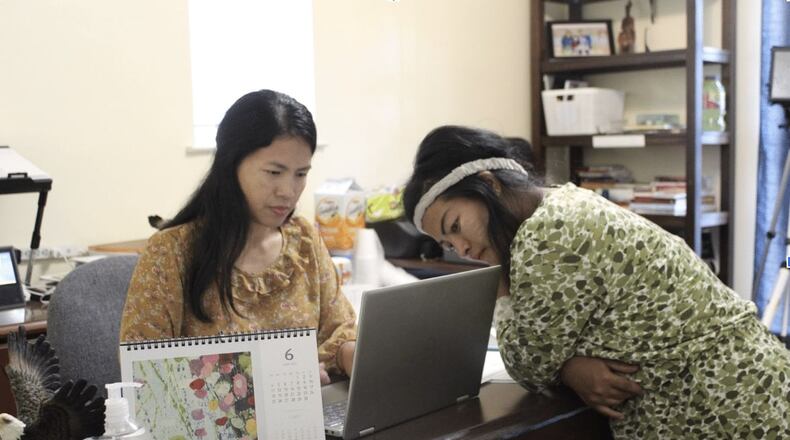In the back room of an apartment complex in Clarkston, Veronica Thang sits down at a desk.
She’s helping a fellow member of the Burmese community, Mary Maan, file an immigration petition to bring her brother to the U.S. They speak quickly in Burmese as Thang types. But every few seconds they are stuck by the most common of online snags – they’ve forgotten the online password. This continues for several frustrating minutes before they’re able to move on.
“Everyday of my life, I need Veronica’s help,” says Maan. She regularly comes to Thang for help reading her mail and for assistance with accessing SNAP (food stamps).
She’s not the only one. Over a half dozen people sit patiently in the living room of the apartment waiting for Thang to help with everything from applying for food stamps to Medicaid renewals.
“Every service that they need in our community, they come to me,” she says.
Credit: Sophia Qureshi
Credit: Sophia Qureshi
Thang had worked for almost 10 years at the Center for Pan Asian Community Services helping refugees. But after funding shortages, she along with dozens of other staffers were laid off. She may have lost her salary and her office, but she still had people who needed her.
“People from the community have my phone number,” she says. “They keep calling me; they need help.”
Every Thursday and Friday, Thang drives from her home in Lawrenceville to the apartment in Clarkson, courtesy of her church pastor who uses it as his regular office and a space for ESL and citizenship classes. Often, community members who speak Karen or Rohingya, languages spoken by Burmese minority groups, will help with interpretation. On the other days, Thang handles as many requests as she can over the phone.
Approximately 6,000 people from Myanmar, formerly known as Burma, have come to Georgia as refugees over the last two decades, originating from diverse minority communities that have been targeted for decades by the military-ruled government in Myanmar. Georgia ranks fifth in the country in the number of refugees from Myanmar taken in. Many settle first in Clarkston and later move to surrounding cities like Tucker and Stone Mountain.
Many of these refugees immediately start work at poultry farms or retail warehouses. That makes finding the time to learn English, make necessary phone calls or fill out online forms to access support and government relief, nearly impossible.
When it became clear she wouldn’t have her job at CPACS for much longer, Thang filed paperwork to register a new organization, Home of Helping Hand, as a nonprofit. The goal, she says, is to create a wider foundation of support for this community.
“I will do as much as I can. I will serve as much as I can for our community,” she said. “That is my dream.”
HOW TO HELP
For more information on Home of Helping Hand, go to facebook.com/HomeofHelpingHand.
About the Author
Live I-75 updates in the Greater Atlanta Area: accidents, road closures and delays
Live I-285 updates in the Greater Atlanta Area: accidents, road closures and delays
Canadian Prime Minister Trudeau flies to Florida to meet with Trump on tariffs threat
Buffalo Bills quarterback Josh Allen and actor Hailee Steinfeld are engaged


